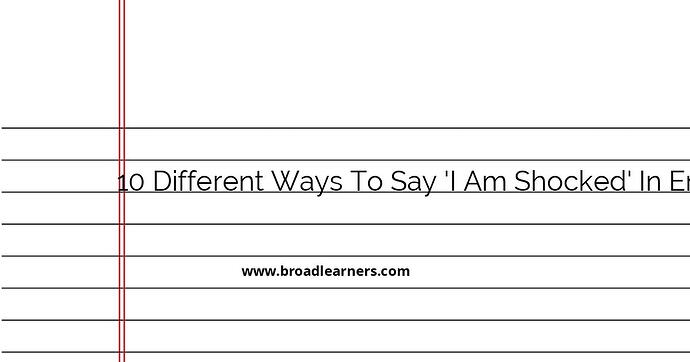Expressing shock or surprise is a common reaction to unexpected or astonishing events. Instead of repeatedly saying 'I am shocked,' it's helpful to have a variety of phrases at your disposal to convey your astonishment in different situations.
Here are 10 different ways to say 'I am shocked' in English:
- I can't believe it!
- That's unbelievable!
- I'm blown away!
- This is incredible!
- I'm in disbelief!
- Wow, I'm taken aback!
- What a surprise!
- I'm astonished!
- That's shocking!
- I'm speechless!
Using these alternative expressions can help you communicate your shock or surprise effectively. Let's explore each phrase in more detail with examples:
1. I can't believe it!
'I can't believe it!' is a versatile phrase that can be used in various situations to express shock or disbelief. It conveys the sense that something is so surprising that it's difficult to accept or comprehend.
Example:
He won the lottery? I can't believe it! That's amazing news!
2. That's unbelievable!
'That's unbelievable!' is a straightforward expression of astonishment. It emphasizes the disbelief and astonishment at the situation or information being discussed.
Example:
She broke the world record? That's unbelievable! I never expected her to achieve such a feat.
3. I'm blown away!
'I'm blown away!' conveys a strong sense of shock and amazement. It suggests that the news or event is so surprising that it has metaphorically knocked the speaker off their feet.
Example:
The surprise party was incredible! I'm blown away by how well everyone kept it a secret.
4. This is incredible!
'This is incredible!' expresses astonishment and admiration for something that is beyond expectations. It implies that what the speaker has witnessed or learned is extraordinary.
Example:
I never thought I'd get this opportunity. This is incredible! I'm so grateful for the chance.
5. I'm in disbelief!
'I'm in disbelief!' indicates that the shock or surprise is so intense that the speaker feels as if they are unable to accept or process the information.
Example:
When I heard the news, I was in disbelief. It took me a while to come to terms with what had happened.
6. Wow, I'm taken aback!
'Wow, I'm taken aback!' expresses surprise or shock that catches the speaker off guard. It suggests that the news or situation was unexpected and has left the speaker momentarily speechless.
Example:
Her sudden resignation took me by surprise. Wow, I'm taken aback! I didn't see that coming.
7. What a surprise!
'What a surprise!' is a simple exclamation that conveys astonishment. It emphasizes the unexpected nature of the event or information.
Example:
They announced their engagement? What a surprise! I had no idea they were planning to get married.
8. I'm astonished!
'I'm astonished!' expresses a high level of shock and amazement. It implies that the speaker is truly taken aback by what they have seen or heard.
Example:
When I saw the final product, I was astonished. The amount of effort and talent that went into it is remarkable.
9. That's shocking!
'That's shocking!' is a direct way to express disbelief or astonishment. It emphasizes the surprising and unsettling nature of the information or situation.
Example:
I just found out the truth, and it's shocking! I never expected such a revelation.
10. I'm speechless!
'I'm speechless!' indicates that the speaker is so shocked or surprised that they are temporarily unable to find words to express their emotions.
Example:
When I saw the breathtaking view from the mountaintop, I was speechless. The beauty was beyond description.
By using these alternative phrases, you can effectively convey your shock or surprise in a variety of situations. Remember to choose the phrase that best suits the level of astonishment you want to express.
Did I miss anything? Respond below
